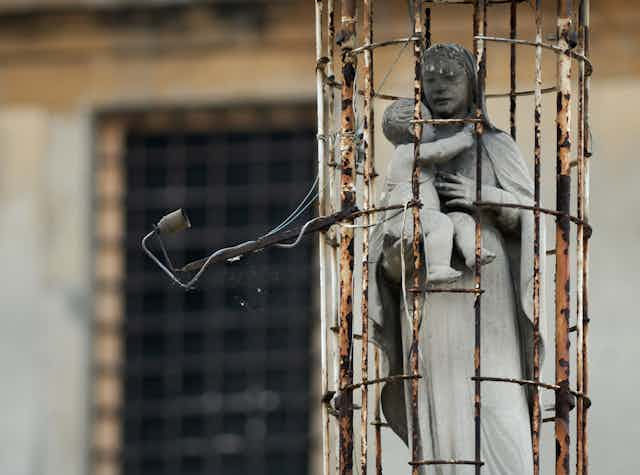Imagine anticipating the birth of your child. You have two weeks until the due date, yet the excitement you should feel is overshadowed by anxiety and stress. You are in prison, coping with a restricted diet, limited information and the knowledge that your baby may be taken away from you immediately after birth. This is the reality for some women who find themselves pregnant and in prison, caught in a system that struggles to meet their basic needs.
It’s a situation that the charity Birth Companions, which has supported pregnant women and new mothers in prison for 20 years, aims to address with the launch of its Birth Charter. A comprehensive set of research-based recommendations, it would improve the lot of mothers and babies in prison in England and Wales if it is taken seriously by the Ministry of Justice.
There are around 4,000 women in English prisons, of which between 6–7% are pregnant at any one time. Between 100 to 150 babies are born each year to incarcerated women. However, there are currently only six mother and baby units offering a total of 64 spaces, which means half these mothers will be separated from their child soon after birth because they haven’t applied for, or haven’t qualified for a place.
Childbirth in prison
Around half of women in prison have been victims of some form of domestic abuse, and around a third have been sexually abused as children. Around 80% of women in prison suffer from mental health problems, and the drug or alcohol addictions that can be the cause of their prison sentences are often a consequence of traumatic life experiences. Together these factors represent a significant risk to their children through the increased possibility that they develop social, physical and mental health issues later in life. Research from NSPCC and Barnardo’s has shown that the children of prisoners are three times more likely to develop antisocial behaviour than their peers.
Women giving birth in a prison setting have described problems that range from a lack of basic information to hunger, safety and the humiliation of visits to hospital in handcuffs. For example, Joelle said:
When I was eight months pregnant and had to go for a late scan, I was handcuffed on my way to the appointment. It was so degrading, people looking at you and judging. It was the worst feeling in the world.
Perhaps the most stressful issue for women is whether they will be able to keep their baby with them while they serve their sentence. Malia found her wait hard to endure:
The not knowing was making me ill, was making me anxious, and just making me so frustrated … I came to prison in May and I was told it’s a two to three month process.

In my current research, I’ve found stress and anxiety to be a recurrent theme among pregnant mothers in prison. Stress is known to increase levels of the hormone cortisol in the mother’s body which crosses the placenta and can affect the baby’s health, brain development, and emotional attachment. Separating mothers from very young babies can have critical effects on the chance for both to form loving and close relationships, and this is well documented.
But for some women, especially those who have led chaotic lives, a spell in prison can be a place of safety – and with the right support, they are able to transform their lives on becoming mothers and then exiting prison. But the NHS has no statutory requirement to offer prisoners antenatal classes and access to healthcare and emotional support for women varies widely from prison to prison. This is a missed opportunity: research shows that women prisoners are receptive to health messages during pregnancy that could help them make positive choices.
The Birth Charter
All these problems are exacerbated by the lack of any specific regulations and guidance for how prisons should deal with pregnant women. However, a window of opportunity opened when in February 2016 the prime minister, David Cameron, spoke on prison reform, urging a re-think of how pregnant women and babies in the prison system were treated.
It’s hoped that the Birth Charter, based on Birth Companion’s expertise through its work with women in prison, and produced with support from the Royal College of Midwives and UNICEF UK’s Baby Friendly Initiative, will form the basis of new legislation that can help the prison service provide humane care for women and babies.
The charter sets out practical recommendations for every stage of pregnancy and birth. For example, prisons housing pregnant women should provide antenatal groups to provide information and emotional support about what to expect in labour and guidance on breastfeeding, with antenatal clinics run by specialist midwives. Pregnant women should be told whether they have a place on a mother and baby unit as soon as possible after arriving in prison, and should be able to choose a supporter of their choice for the birth.
New mothers who keep their babies should have the equivalent of maternity leave from prison duties to allow them to bond with and breastfeed their baby. Women who are separated from their babies should have access to counselling.
The prime minister’s speech seemed to indicate a radical re-think of whether women near to giving or having recently given birth should be in prison at all. But providing the right support for pregnant women and new mums is difficult anyway, and especially so within a secure prison environment. By drawing attention to this issue, the charter will hopefully make it easier for the prison service to do more for these vulnerable inmates – and help reduce the ill-health and social problems passed on to the next generation.

